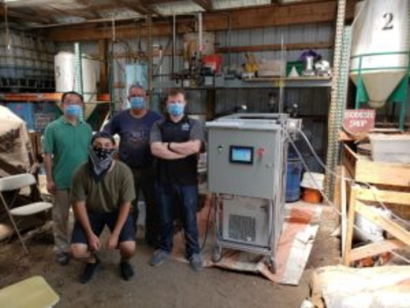
Technology Overview
Optiperm biogas reduces the stages, compression, and pretreatment needed to upgrade biogas streams. The lower operating pressure (2-3 bara) makes the upgrading process more energy efficient than current high pressure membrane solutions. The fluoropolymer nature of the membranes provides stability in H2S, and resistance to common poisons like hydrogen, water vapor, and CO. The technology is scalable and can produce economically viable biogas upgrades for small, medium, and large streams. Optiperm biogas permeates the carbon dioxide, water, and hydrogen sulfide, leaving upgraded methane in the retentate.
Pilot Results
Working with Dickinson College Energy Projects Manager Matt Steiman, a spiral wound module system was installed at the Dickinson College Farm in late 2020. During the pilot installation, Optiperm biogas demonstrated stability and verified the performance that was measured in CMS laboratory testing. The unit took feed directly from the digester with no pretreatment and operated at a feed pressure of 2.7 bara. The feed contained 56-60% methane with balance carbon dioxide, 300 ppm H2S and was saturated with water vapor.
In a single stage, Optiperm biogas achieved:
The next steps include scale-up of the membrane modules for commercial use.

